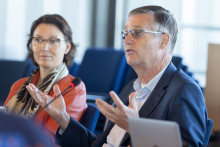The Accreditation Organisation of the Netherlands and Flanders (NVAO) visited twice in November and December, spread over five days. What are their first findings?
Wichman: ‘Nothing has been formally decided yet, but informally the committee shared its impressions with us at the end of the last day. The university must meet four standards for the institutional audit. The committee has informed us that the UT complies with all these standards in the field of education and its quality assurance. The committee mentioned, among other things, the passion for education, a culture of permanent development and the Twente Education Model that has been fully embraced by the UT.’
The committee also specifically looked at the so-called quality agreements. In other words, how the UT spends the money that has been released by the missing basic study grant (basisbeurs). What about that?
‘Again, positive. According to the committee, we amply meet the set of criteria for these quality agreements. In anticipation of the NVAO visit, we were able to combine preparations for the institutional test with our plan for quality agreements. We have a flat organization, a strong educational culture, active students and TOM. So we were confident that bottom-up initiatives from the workplace and UT-wide education policy would come together. That was the case, according to the committee.’
The committee also came up with a number of recommendations and points of attention. For example, they mentioned paying attention to the Dutch language. And show courage by promoting good teachers to professors. The committee also wanted clarity about the different roles of the University Education Committee (UC-OW).
‘The committee understood very well that we have introduced English as the official language. At the same time, it indeed advised to continue to pay sufficient attention to the Dutch language. The latter is also explicitly stated in our language policy. We received compliments for the fact that we have a career path for professors with an emphasis on education. The committee also found us somewhat cautious about this and advised us to take the step of appointing very good teachers as professors, but our policy doesn’t go that far at the moment.’
‘The UC-OW advises the Executive Board on major strategic policy issues in the field of education. In addition to the rector as chairman, this includes the education portfolio holders of the faculties. The moment the UC-OW seems to take decisions, it is about more tactical-operational matters. The actual decision-making will then take place within the faculties. The UC-OW therefore appears to have both an advisory function and a decision-making function. The function of the UC-OW and the role of the portfolio holders is something to keep in mind.’
How do you look back on the process?
‘The process started with a reflection on our own actions during the past six years, so with the preparation of a critical reflection that came about in one year. The NVAO committee intensely focused on this during its visits. Such a committee wants to hear and see on all levels – from the Executive Board member to the students –that the things we have written down are actually shared and experienced. We experienced the committee as very knowledgeable and personal. They were people from the higher education field who, according to our own people, were persistent with their questions and were very appreciative of frankness. All in all, they were visibly impressed.’

UT secretary Susanne Wichman.
Who determines who the committee speaks to?
‘The NVAO gave a format in which they stated which categories of staff and students they wanted to talk to in different sessions, all in all a mixed company. We then provided them with names per session. In the run-up to the visit there was also the opportunity for every UT student or staff member to submit a request to speak with the committee. The committee also had a separate lunch with a delegation of students, for which the SU approached students. We also insisted that the committee should have a separate session with the university council, which took place.’
To what extent are the reports of the committee and the decision-making about them a formality?
‘It would be strange if the content of the committee's reports are not in line with the findings that the committee shared with us. But ultimately the NVAO, not the committee, determines whether we have passed this institutional audit. And it is up to Minister Van Engelshoven to give her opinion about our plans for the quality agreements. We at least assume that the reports will provide a comprehensive and nuanced picture of the findings and recommendations of the committee. We can use that input for the upcoming years.’







